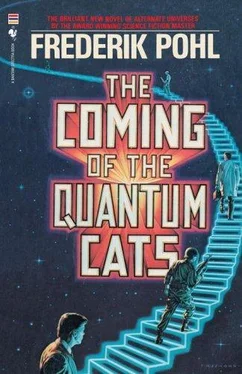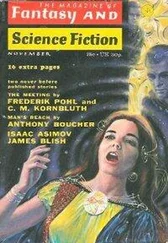Frederik Pohl - The Coming of the Quantum Cats
Здесь есть возможность читать онлайн «Frederik Pohl - The Coming of the Quantum Cats» весь текст электронной книги совершенно бесплатно (целиком полную версию без сокращений). В некоторых случаях можно слушать аудио, скачать через торрент в формате fb2 и присутствует краткое содержание. Год выпуска: 1986, ISBN: 1986, Издательство: Bantam Books, Жанр: Фантастика и фэнтези, на английском языке. Описание произведения, (предисловие) а так же отзывы посетителей доступны на портале библиотеки ЛибКат.
- Название:The Coming of the Quantum Cats
- Автор:
- Издательство:Bantam Books
- Жанр:
- Год:1986
- ISBN:9780553763393
- Рейтинг книги:5 / 5. Голосов: 1
-
Избранное:Добавить в избранное
- Отзывы:
-
Ваша оценка:
- 100
- 1
- 2
- 3
- 4
- 5
The Coming of the Quantum Cats: краткое содержание, описание и аннотация
Предлагаем к чтению аннотацию, описание, краткое содержание или предисловие (зависит от того, что написал сам автор книги «The Coming of the Quantum Cats»). Если вы не нашли необходимую информацию о книге — напишите в комментариях, мы постараемся отыскать её.
The Coming of the Quantum Cats — читать онлайн бесплатно полную книгу (весь текст) целиком
Ниже представлен текст книги, разбитый по страницам. Система сохранения места последней прочитанной страницы, позволяет с удобством читать онлайн бесплатно книгу «The Coming of the Quantum Cats», без необходимости каждый раз заново искать на чём Вы остановились. Поставьте закладку, и сможете в любой момент перейти на страницу, на которой закончили чтение.
Интервал:
Закладка:
And when, half an hour later, the clerk at last called my name, the judge conferred in whispers with another court attendant, then scowled at me. "Mr. DeSota," he said, "your summonsing officer has been called away on urgent police business and cannot testify against you. Therefore, under the law, I have no option but to dismiss the charges. You're a free man, Mr. DeSota, and, I may add, a very lucky one."
I did not disagree at all.
I was so pleased to be out of it that I was halfway home before I realized my beeper was beeping. I stopped at a filling station and while the high-test was running into my tank I called the message center. This time they had tuned me in exactly and the operator had every word of the message. So, this time, it was the message itself that left me bewildered. Pronounced syllable by syllable with care, it said:
"You don't need to know my name and you don't need to know why I care what happens to you or how I know who you are or anything like that. But if you want help with the thumbless lady, have a tunafish-salad sandwich at the Carson, Pine, Scott coffee shop this evening at six P.M. "
"That's it?" I asked.
"Yes, sir," said the operator, very sweet, very competent. "Would you like me to repeat the message? No? Then just let me say, sir, that it's the occasional message like yours that makes this job such a fun thing to do! Thank you, Mr. DeSota, thank you very much."
"You're welcome," I said, and sat there staring out the windshield until the gas jockey rapped on my window. "Sorry," I said, and fished out the money to pay him—sixty-nine cents a gallon! If I'd looked at the prices I never would have stopped there.
But I didn't have room in my head to think about that; I was too busy thinking about the message. And the mistaken-identity thing with the FBI. And getting off so lightly in traffic court. And all the other weirdnesses that were infesting my life and the world. Under normal circumstances I would have ignored the message. It was exactly the kind of cloak-and-dagger thing that a sensible person would stay far away from. Taking time off to go there would, as a minimum, mean taking off more time from my main business in life, namely the arranging of mortgages for needy home buyers. The boss would not be pleased. And the whole thing was fishy. Going there might easily get me in trouble I couldn't get out of.
Naturally I went.
There was a novel that Greta and I were reading once where one of the characters said something like, "She went into a department store, one of the places where women gladly go but few men are willing to follow." Greta said she thought that was sort of derogatory toward women. "Women don't like to shop," she said. "It's just that they have to. They're the ones that buy the groceries and the household furnishings and all the other things people have to buy for a family."
"They don't buy the cars," I pointed out.
"No, of course. They don't buy the major capital-expense items, naturally," she agreed. "But that sort of thing you only do once every few years. Day in, day out, there's all the consumable stuff that has to be bought. If a woman spends a lot of time buying it, that's because it's her job. To compare prices and values. It's how she conserves her family's spending money. Whether she likes it or not doesn't matter. She has to do it anyway."
"Right, honey," I said, grinning.
She didn't like the grin. "No, Nick, I'm serious! You shouldn't say women like to shop. You should just say it's their job to shop."
"Now, Greta," I said reasonably, "just think this thing through, will you? How can you say it's derogatory to somebody to say she likes to do her job? I like my job too."
"That's not at all the same thing," she said, but she didn't say it angrily, and then she changed the subject. She was good about that. Greta was not one of your suffragettes. She told me a hundred times that if she got the vote she wouldn't know what to do with it. But the thing about Greta was that she had a good job as a stewardess, and it made her a little—well—I don't want to say mannish or anything like that. Not independent, exactly. And it was all conversation, of course; if I ever popped the question I knew what she would say, and once we were married there'd be no more of those funny ideas.
I did worry about her a little now and then, though.
Right then my worries were a lot more immediate. What made me think about all this was that, looking around the Carson coffee shop, I felt that line from the novel was right on target. There were a hundred customers scattered around the big room—green porch furniture for tables and chairs, hanging plants everywhere—and ninety-five of them were women. There were no single men, or pairs of men. Here and there a couple, maybe, the man generally elderly, and always with that hangdog "Oh-my-God-I've-blundered-into-the-ladies'-toilet" look.
I guess that was why I assumed that my Mystery Caller would be female. That shows how reliable my assumptions are.
After twenty minutes, and the third time the elderly waitresses came by to inquire if I was ready to order, I was. After another twenty minutes my tuna-salad sandwich arrived.
And twenty minutes after that—after I had eaten half the sandwich and was trying to make myself leave the other half on the plate as a recognition signal—I felt someone pass rapidly behind me. When I looked up there was a man already seated across the table.
I knew him. He wasn't wearing a white suit, but he had been not too many hours earlier.
"Well, hello," I said. "I might have guessed it was you."
The waitress was hovering nearby; he glanced at her, then frowned meaningfully at me. "Hello, there," he said, tone that of two old business acquaintances, not in the least surprised to have run into each other this way. But if he knew my name, he didn't use it. It was "Long time no see," and "How are you, then?" and no nonsense about waiting for me to answer. When the waitress had taken his order and gone off with it he said in a conversational tone, "You weren't followed here. There's nobody in the restaurant watching you. We can talk."
There is just so much mystery I am willing to put up with. I picked up the other half of my sandwich and regarded him over a bite of it. Youngish fellow, two or three years younger than I. Open-faced, freckled, sandy-haired—the boy next door, the one you knew would never do anything mean or sneaky. Except that here he was being a sneak. "What are we going to talk about?" I asked, my mouth full of tuna fish and cracked-wheat toast. "And who am I talking to, then?"
He made an impatient gesture. "Call me Jimmy. Names don't matter. What matters is, what were you trying to do at Daleylab?"
"Ah, Jimmy," I said sadly, and put down the rest of my sandwich. "This is stupid," I said. "You go back and tell Chief Agent Christophe that the trick didn't work."
He frowned at me for silence while the waitress brought his ham and cheese sandwich. Then, "There's no trick," he said.
"There's nothing but a trick, Jimmy. I was never anywhere near Daleylab, and you and Christophe better know it."
"Don't jerk me around," he said. "They've got your picture."
"It's a fake."
"Fingerprints? They fakes too?"
I said steadily, "Anything at all they've got that says I was trying to break into Daleylab last Saturday night is a fake, because I wasn't."
He chewed on his ham and cheese, studying me suspiciously. I studied him back. Not only was he younger than I, he was taller and a lot better looking. A whole lot better dressed. The white suit he'd worn that afternoon was flashy. This one wasn't flashy, but it was cut nicely out of real English fabric—seventy-five dollars at least, and matching shoes that hadn't come from any Thom McAn I ever saw. He said suddenly, "Nyla thinks your alibi witnesses are lying."
Читать дальшеИнтервал:
Закладка:
Похожие книги на «The Coming of the Quantum Cats»
Представляем Вашему вниманию похожие книги на «The Coming of the Quantum Cats» списком для выбора. Мы отобрали схожую по названию и смыслу литературу в надежде предоставить читателям больше вариантов отыскать новые, интересные, ещё непрочитанные произведения.
Обсуждение, отзывы о книге «The Coming of the Quantum Cats» и просто собственные мнения читателей. Оставьте ваши комментарии, напишите, что Вы думаете о произведении, его смысле или главных героях. Укажите что конкретно понравилось, а что нет, и почему Вы так считаете.












